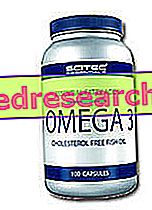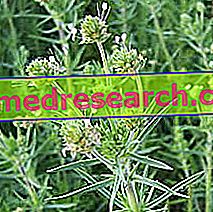
Information on Omega 3 Essential - Scitec Nutrition
OMEGA 3 ESSENTIAL - SCITEC NUTRITION
Food supplement of omega 3 essential fatty acids
FORMAT
Pack of 100 capsules
COMPOSITION
Fish oil (herring, anchovies, mackerel, sardines, sprats, salmon); eicosapentaenoic acid (EPA); docosahexanoic acid (DHA); omega-3 fatty acids; jelly; glycerine.
Nutritional information
Media Analysis | Per daily dose |
Energy value | 30 Kcal / 125.4 Kj |
Total fats | 3 g |
Fish Oil | 3.6 g |
Omega 3 | 1.2 g |
EPA | 648 mg |
DHA | 432 mg |
other fatty acids | 144 mg |
Product features Omega 3 Essential - Scitec Nutrition
The supplement in question guarantees an average intake of about 400 mg of omega 3 per capsule, extracted through molecular distillation directly from various fish oils. Also for this integrator the IFOS quality certification is missing, which certifies its quality and purity.
Furthermore, the absence in the formulation of an antioxidant compound that can preserve the fatty acids from the lipoperoxidation processes, avoiding the formation of reactive species potentially harmful for the human organism should be considered.
Omega 3 fatty acids - they are essential fatty acids, as they are produced by the human body only in very small quantities, not enough to perform their biological function.

Despite the organism presenting biochemical pathways useful for the synthesis of these substances, the quantity produced is insufficient. Therefore, to satisfy daily needs, it is necessary to resort to food intake. More precisely, it has been estimated that the weekly intake of at least 4 portions of fish, alternated with the addition of nuts to the common feeding, may already be sufficient.
The revaluation of these nutrients for the protection of human health was born from the observation of the dietary habits of the Eskimos and from the very low incidence of cardiovascular diseases and accidents, which have paved the way for the characterization of these molecules and their biological functions. Recent studies have in fact noticed how the alteration of the relationship between omega 6 fatty acids and omega 3 fatty acids, generally found in the western diet characterized by the excessive consumption of foods of animal origin, correlates directly with an increased cardiovascular risk and with an increase of associated mortality. Therefore, the main purpose of supplementation with these products is precisely to rebalance this relationship and prevent the onset of heart and vascular disorders.
Omega 3 fatty acids and biological effects
Although the main therapeutic application of omega 3 fatty acids remains that relating to the prevention of cardiovascular diseases, recent studies have shown an extension of efficacy also for:
- metabolic pathologies: thanks to the documented protective action against diabetic disease and inflammatory diseases;
- psychiatric diseases: integration with omega 3 was able to improve the psychological state of patients suffering from major depression;
- systemic diseases: the anti-inflammatory action of these substances is documented, and the improvement action against hypertriglyceridemia and hypercholesterolemia.
Although there is still no consensus on all the potential benefits of omega 3 supplementation, and their molecular action mechanism has not yet been clarified in detail, there are clear therapeutic and preventive indications based on the use of these products .
Omega 3 fatty acids in sports dietetics
Despite the fact that in the sporting world the omega 3 fatty acids are not counted among the most used and effective supplements, there is no lack of experimental evidences related to their usefulness for the athlete's well-being. Although not translating into obvious advantages in the short term, related to the optimization of performance, the benefits deriving from a correct supplementation with omega 3 can improve the systemic condition of the sportsman, materializing in:
- increase in transmission capacity at the level of the central nervous system, with a reduction in reaction times;
- anti-inflammatory action, guaranteed by the decrease in the levels of inflammatory cytokines, able to protect both the muscle tissue, the attached tendons and ligaments, from functional and structural damage;
- improvement of cardiac contractile capacity and reduction of vascular resistance;
- improvement of the athlete's respiratory capacity.
Recommended use by the company - Omega 3 Essential - Scitec Nutrition
Take one capsule three times a day, preferably with meals.
Use in sports - Omega 3 Essential - Scitec Nutrition
Different, relative to the use of omega 3 in sports, are the dosages proposed by the scientific world. Normally, the doses are between 2 and 4 grams per day, and last for at least 4 weeks, even if the most replicated dose seems to be that of 2/3 grams / day.
Although manufacturers suggest dosages and different intake times, it must always be considered that this type of integration is born with the aim of rebalancing the ratio between omega 3 and omega 6, so supplementation should take into account any consumption of fish, linseed oil, flaxseed and all those foods source of omega 3. Therefore, the period of administration should also be evaluated based on these characteristics.
As for the intake, given the lipidic nature of the compound, it would be preferable to take the supplement during the main meals, in order to optimize the absorption profile.
Synergies - Omega 3 Essential - Scitec Nutrition
Several studies show a greater efficacy of action associating to the omega 3 antioxidant substances able to assist the protective action on the stability of the plasma membranes.
Furthermore, for supplementation to guarantee the effects described, it is also necessary that the diet follows the general principles of a healthy diet and is accompanied by controlled exercise.
Side effects Omega 3 Essential - Scitec Nutrition
Excessive intake of omega 3 can be associated with immediate phenomena such as nausea, vomiting, gastric and erythema burning, and systemic effects of a different nature.
In the literature, cases of bleeding (due to the anticoagulant action of the omega 3) are described; therefore it is necessary to pay attention to possible interactions with aspirin or other anticoagulants, and in the case of haemophilic pathology or alterations of the glycemic profile in patients suffering from non insulin dependent diabetic pathology.
It should be reiterated that the dose between 2 and 5 grams per day seems to be quite safe, and without the aforementioned side effects.
Precautions for use Omega 3 Essential - Scitec Nutrition
The product is contraindicated in cases of renal or hepatic disease, cardiovascular disease and / or hypertension, allergies and autoimmune diseases, during pregnancy, during breastfeeding, under 12 years and for adolescents not yet trained.
In the event of prolonged use (over 6/8 weeks), medical advice is required.
This article, elaborated on the critical re-reading of scientific articles, university texts and common practice, is for informational purposes only and is therefore not a medical prescription. It is therefore always necessary to consult your doctor, nutritionist or pharmacist before starting to use any kind of supplement . Further information on the critical analysis of Omega 3 Essential - Scitec Nutrition.
| BIBLIOGRAPHY |
J Am Coll Nutr. 2009 Aug; 28 Suppl: 473S-481S. Effect of omega-3 and policosanol supplementation on attention and reactivity in athletes. Fontani G, Lodi L, Migliorini S, Corradeschi F. Int J Sport Nutr Exerc Metab. 2009 Oct; 19 (5): 536-46. Nieman DC, Henson DA, McAnulty SR, Jin F, Maxwell KR. Nutr Res. 2009 May; 29 (5): 305-12. Cardiovascular risk factors in young, overweight, and obese Europeans and associations with physical activity and omega-3 index.Ramel A, Pumberger C, Martinéz AJ, Kiely M, Bandarra NM, Thorsdottir I. J Sci Med Sport. 2010 Mar; 13 (2): 281-6. Epub 2009 Jun 12. The effects of omega-3 supplementation on pulmonary function of young wrestlers during intensive training.Tartibian B, Maleki BH, Abbasi A. Clin J Sport Med. 2009 Mar; 19 (2): 115-9. The effects of ingestion of omega-3 fatty acids on perceived pain and external symptoms of delayed onset muscle soreness in untrained men.Tartibian B, Maleki BH, Abbasi A. Eur J Appl Physiol. 2008 Oct; 104 (3): 455-61. Epub 2008 Jun 18. Walser B, Stebbins CL. J Sci Med Sport. 2009 Jul; 12 (4): 503-7. Epub 2008 Jun 13. DHA-rich fish oil lowers heart rate during submaximal exercise in elite Australian Rules footballers.Buckley JD, Burgess S, Murphy KJ, Howe PR. Curr Sports Med Rep. 2007 Jul; 6 (4): 230-6. Omega-3 fatty acids and athletics.Simopoulos AP. Am J Clin Nutr. 2007 Mar; 85 (3): 803-7. n-3 Fatty acids are positively associated with peak bone mineral density and bone accrual in healthy men: the NO2 Study.Högström M, Nordström P, Nordström A. J Psychiatr Res. 2008 Jan; 42 (1): 58-63. Epub 2006 Oct 30. Omega-3 fatty acids on the forced-swimming test.Huang SY, Yang HT, Chiu CC, Pariante CM, Su KP. Eur J Appl Physiol. 2004 Aug; 92 (4-5): 584-91. Epub 2004 Mar 30. Effect of n-3 fatty acids on free tryptophan and exercise fatigue.Huffman DM, Altena TS, Mawhinney TP, Thomas TR. Crit Care Clin. 2010 Jul; 26 (3): 501-514. Fish Oil in Critical Illness: Mechanisms and Clinical Applications.Stapleton RD, Martin JM, Mayer K. J Alzheimers Dis. 2010 Jul 15. [Epub ahead of print] Omega-3 Fatty Acids, Cognitive Decline, and Alzheimer's Disease: A Critical Review and Evaluation of the Literature.Huang TL. Cardiovasc Ther. 2010 Aug; 28 (4): 202-15. Nutraceuticals and atherosclerosis: human trials.Badimon L, Vilahur G, Padro T. Cell Mol Biol (Noisy-le-grand). 2010 Feb 25; 56 (1): 28-37. Omega-3 (n-3) fatty acids, cardiovascular disease and stability of atherosclerotic plaques.Calder PC, Yaqoob P. BMC Cardiovasc Disord. 2010 Jun 3; 10: 24. Omega-3 fatty acids in high-risk cardiovascular patients: a meta-analysis of randomized controlled trials. |



